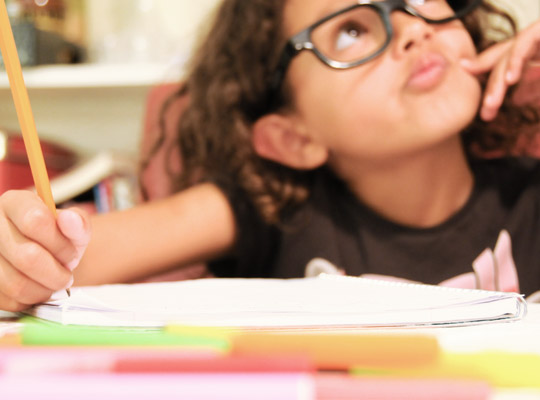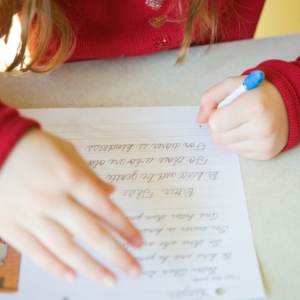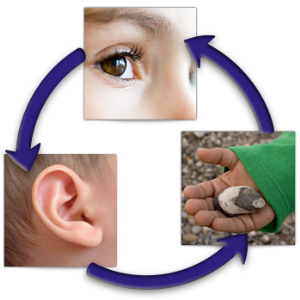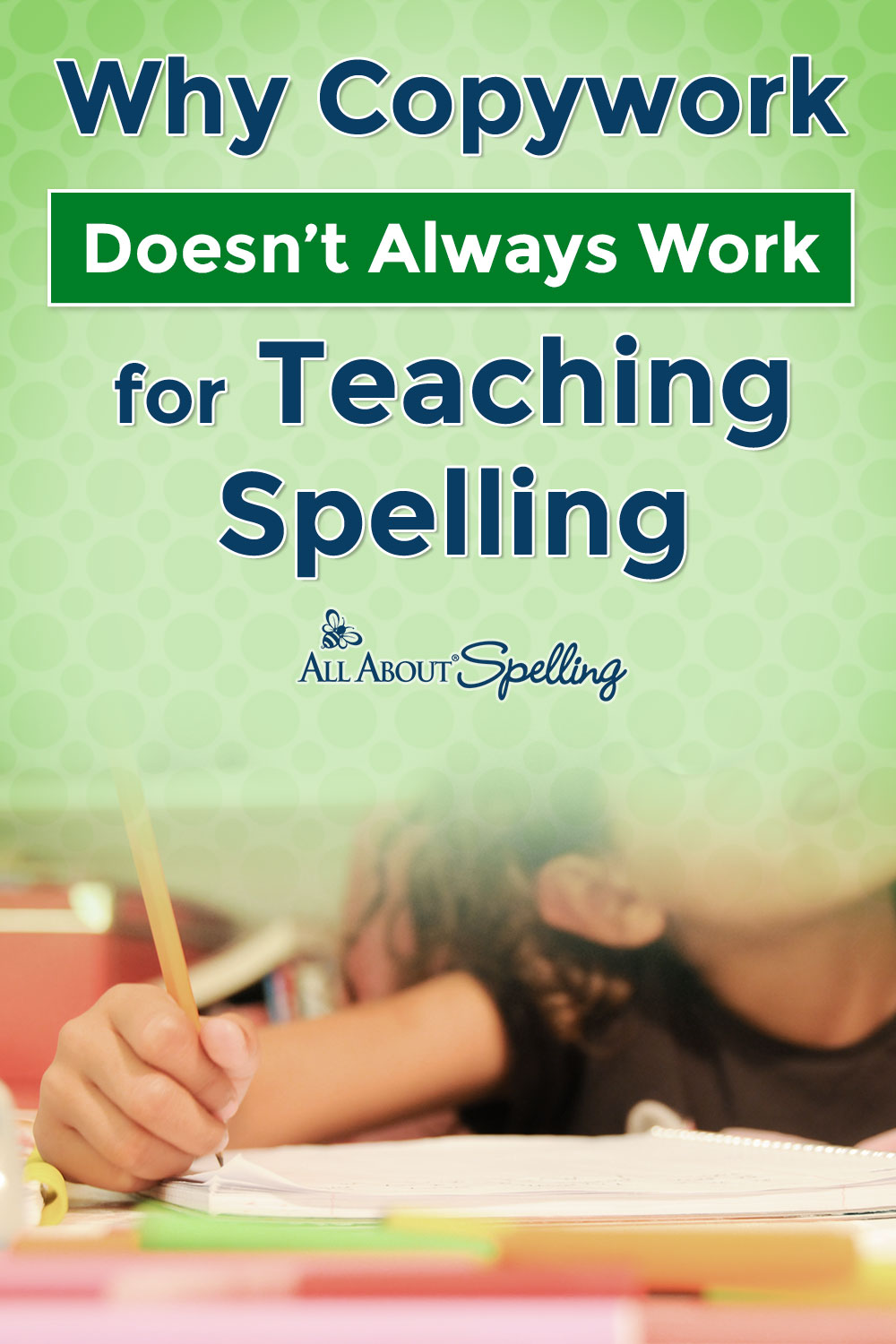Why Copywork Doesn’t Always Work for Teaching Spelling

Perhaps you’ve heard of using copywork to teach spelling. Maybe you’ve even assigned some spelling copywork to your children. Still, you may be wondering about the benefits of this popular homeschool discipline.
And more importantly—does it really work?
What Is Copywork?
Copywork is exactly what the name implies—an exercise of copying words from a written example or model.
For younger children, copywork may consist of copying the letters of the alphabet and single words. Older children copy sentences, paragraphs, and eventually entire pages. Content often comes from Scripture, poetry, historical documents, speeches, and other writings of historical or moral value.
The Primary Goal of Copywork

The primary goal of copywork is for a child to internalize the mechanisms of good writing—penmanship, spelling, grammar, and style—by copying a perfectly composed sample.
In theory, the more a child transcribes, the more proficient she will become in the English language. As she replicates good writing, the intent is that she will adopt the language skills found in the sample.
As a side benefit, the child is exposed to desirable character traits and virtues as she copies the chosen text.
Does Copywork Work?
Copywork is a rich and useful method of teaching many subject areas, but it isn’t always effective in achieving long-term retention in spelling. Here are a few things to consider before choosing to use copywork as part of your child’s spelling program.
Copywork lacks the direct spelling instruction that many children need.
Copywork doesn’t provide the phonetics-based approach that helps children make sense of spelling. Instead, copywork depends on memory to help a child learn to spell. If your child learns quickly and easily memorizes words through repetition, copywork may work well for her. Copywork can also be a good fit for kids who naturally find patterns in related words. But most children are better off learning to spell through direct phonetic instruction and systematic review.

Copywork emphasizes visual learning.
Copywork focuses on the visual learning pathway but doesn’t include the support that many students need. Even a student who is visually inclined may actually learn best when instruction comes through all three pathways to the brain—visual, auditory, and kinesthetic—instead of just one. The more senses we involve, the more learning occurs.
Copywork isn’t ideal for distracted students.
Since copywork offers limited sensory stimulation, it can be easy for a child to “go through the motions” of copying while gaining very few of the benefits. Such a child may get to the end of a copywork exercise with little memory or understanding of what he just copied!

For some children, doing copywork switches their brains onto “auto-pilot.” It’s not unlike driving to the store and realizing that you’ve arrived safely but with no memory of the drive.
Copywork may be especially detrimental for a struggling speller.
Since copywork doesn’t provide the hands-on instruction that many children need, it can leave them floundering even while giving the impression that they’re doing well. A beautifully copied passage does not always translate into long-term learning.
The Real Goal: Long-term Learning
When I teach, my goal is long-term learning with the least amount of frustration possible. As many of you know, I tried dozens of methods for teaching spelling before creating All About Spelling. I’ve made it my life’s work to help kids learn easily and permanently. So when I created All About Spelling, I made sure that it was based on solid research and that it included:
- Multiple ways to reach students using visual, auditory, and kinesthetic teaching methods.
- Strategies for actively involving your child in the lessons, so you can keep his or her attention with very little effort.
- Techniques for getting your child to recognize and correct his or her own spelling errors.
- And dozens of tips for the teacher to help you maximize your effectiveness on every level.
A complete and comprehensive spelling program provides children—even struggling learners—with an extremely effective method of learning that takes advantage of how the brain works. While copywork may be a part of that method, it must be combined with activities that take into consideration all the pathways to the brain.
Wouldn’t it be nice if spelling could be EASY? Our free report, “Six Ways We Make Spelling Easy,” takes you on a guided tour of All About Spelling and the elements that set it apart from other spelling programs.











Caroline Hartmann
says:Looking forward to trying it out
Renee
says:Yes! I appreciate this blog/article. We are in our 2nd year with All About Learning (AAR & AAS). I choose to not do copywork because I want my kids to try their best and be confident and independent spellers/readers. They have no problems writing sentences on their own thanks to this curriculum!
Robin
says: Customer ServiceIt’s so great to hear that your students are writing sentences well, Renee! Thank you!
Christian
says:Good insight
Danielle
says:This is so interesting!! I always wanted to make copy work a daily habit in my homeschool, but it’s such a struggle that we rarely do it at all.
Lauren
says:I found this very helpful in that I would have tried copy work to help teach spelling
Lynn
says:We use copy work to practice handwriting and not so much for spelling.
Feen
says:We have not found success with copy work. Segmenting sounds and breaking into syllables from All About Reading has proven extremely beneficial!
Matt Prahl
says:Why should your school at home look public school?
Customize all the things! For all the kids!
Robin
says: Customer ServiceThank you, Matt!
Cynthia
says:We are using All about Reading currently and definitely considering All about Spelling for this coming year. Love that it is in color now!
Cynthia
says:Best reading and Spelling my child has used!
Aradhna
says:Love all about spelling for my kids!!
Judy Bennett
says:This program looks great! So well planned out, especially with the colored tiles!
Katie K
says:We use copy work for handwriting practice.
Gloria
says:I love using all about learning! My daughter is reading!
Theresa Gutierrez
says:Love AAR and AAS for my kids!
Sarah
says:We like using copywork for the handwriting practice.
Jackie Simon
says:Copy work for small things, but to prevent lazy work and miss spelled words I don’t do much. We love All about reading and spelling.
Talitha Keller
says:Thank you for this info!
Siddiqa Abbas
says:Indeed useful information. From now onwards will try to use phonetic approach instead of copywork method for spellings.
Kierra
says:I’m totally in agreement with this. Copywork wasn’t something my kid enjoyed and I found being creative was the way to go!
Jennifer
says:My daughter has finally found success with All About Spelling. We tried other programs without success, but without success. This program has worked to improve both my daughter’s spelling and reading skills. I highly recommend this program. It has helped my daughter so much that I have purchased All About Reading for her next year to go along with All About Spelling.
Robin
says: Customer ServiceJennifer,
I’m so happy to hear that All About Spelling has made such a big impact on your daughter’s spelling and reading! Wonderful! Thank you for sharing.
Jessica
says:We use copywork and it does help with spelling but we definitely needed more practice and more structure to improve spelling.
Beth
says:This would explain how my kids often end up with misspellings in their copywork that wasn’t in the original. Autopilot indeed!
Angelica
says:This is a great program!.
Angelica
says:This is a great program. Sometimes we do Copywork but not to teach spelling.
Kristen
says:Agree! It is not one size fits all!!
Diana Johnson
says:Great program we love it
Lyndsi Olinger
says:I completely agree with this, and why I cannot wait to start using your program! As a former teacher, who is now home, and teaching my kids at home, I have done extensive research on so many curriculums out there, and this is by far one of my favorite that i cannot wait to receive for my children.
Robin
says: Customer ServiceWow, thank you, Lyndsi!
Raven
says:I completed the AAR pre reading with my 3 year old and she loved it. She is now currently working on Level 1 AAR and she just turned 4. My 2nd child will now begin the pre reading and she is super excited to follow in her sisters steps. The way the curriculum is set up is super easy and extremely flexible. We love ziggy, and we hope other families give this a try because our children have truly benefited from this curriculum.
Robin
says: Customer ServiceRaven,
It’s so great to hear that your child is already working on reading at such a young age, and her little sibling is set to follow! Great work!
Kelly
says:This is amazing!!!